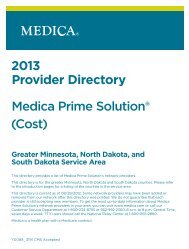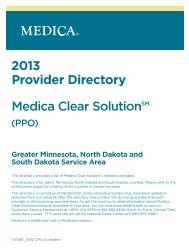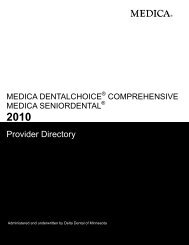HSA FAQ - Medica
HSA FAQ - Medica
HSA FAQ - Medica
You also want an ePaper? Increase the reach of your titles
YUMPU automatically turns print PDFs into web optimized ePapers that Google loves.
What can distributions from the <strong>HSA</strong> be used for?The amounts can be distributed for either qualified medical or other expenses. If the amount distributed is usedfor qualified medical expenses, then the distribution is free from federal taxes. If the amount distributed is usedfor other than qualified medical expenses, the amount distributed will be subject to income tax and anadditional 20% tax penalty.What happens to the money in your <strong>HSA</strong> when you reach age 65?Once you reach age 65, the amounts can be used for health expenses and to pay health plan premiums. Itcannot be used to purchase a Medigap policy. It can also be used for non-medical expenses, but the amountdistributed will be subject to income tax, but not the penalty tax.Can anyone make catch-up contributions to an <strong>HSA</strong>?Individuals 55 and older who are covered by a High Deductible Health Plan can make additional catch-upcontributions as defined by federal guidelines on a yearly basis (in 2013, the maximum catch-up contribution is$1,000).Are dental and vision qualified medical expenses under an <strong>HSA</strong>?Yes, as long as these are deductible under the current rules. For example, cosmetic procedures like cosmeticdentistry are generally not deductible and would not be considered qualified medical expenses.What are other qualified medical expenses?Here is a partial list of expenses that may be considered qualified medical expenses. Remember that current IRSrules will govern what is actually considered a qualified medical expense. If you have any questions, you shouldreview the IRS rules at http://www.irs.gov/publications/p502/ar01.html or consult the IRS for furtherinformation.• Adoption related medical services• Alcoholism• Ambulance hire• Artificial limbs• Artificial teeth• Bathroom modifications for the disabled• Birth control pills• Braces• Care for mentally disabled child• Chiropractors• Christian Science practitioners’ fees• Coinsurance medical/dental plans• Contact lenses• Costs for physical or mental illness confinement• Crutches• Deductibles under medical/dental plans• Dental expenses• Dentures• Diagnostic fees• Disabled persons’ special schools• Electrolysis• Eyeglasses, including examination fee• Fees of practical nurse• Fees of licensed osteopaths• Hair transplants• Hearing devices and batteries• Hospital expenses• Insulin• Intellectually and developmentally disabled, special home for• Laboratory examinations and tests• Laetrile by prescription• Lead base paint removal for children with lead poisoning• Life fee to retirement home for medical care• Membership fees in association furnishing medical services,hospitalization, and clinical care• Nurses’ fees (including nurses’ board and Social Security taxwherepaid by taxpayer)• Obstetrical expenses• Organ transplant• Orthodontia• Orthopedic shoes• Oxygen• Physician fees• Physician recommended weight loss or smoking cessationprogramsfor specific illness• Prescribed medicines• Psychiatric care• Psychologist fees• Routine physicals and other non-diagnostic services ortreatments• Seeing eye dog and its upkeep• Special communication equipment for the hearing impaired• Special education for the visually impaired• Sterilization fees• Surgical fees• Therapeutic care for drug and alcohol addiction• Therapy treatments• Tuition at special school for disabled• Well-baby care• Wheelchair• X-rays* Please note that <strong>Medica</strong> and its employees are not to be considered replacements for qualified tax advisors. Thisinformation is provided only as a high-level guide and is not intended nor should it be construed as tax or legal advice.2IFB4865-10313





